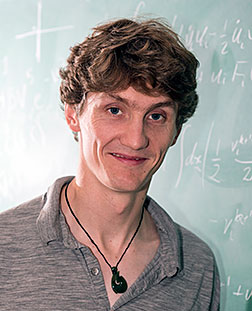- Number 421 |
- September 1, 2014
Grad student's astrophysical insights could apply to fusion

Graduate student Jonathan Squire
Graduate student Jonathan Squire has won a highly competitive Honorific Fellowship from the Princeton University Graduate School. The award, for which Squire was nominated by the Princeton Program in Plasma Physics at DOE's Princeton Plasma Physics Laboratory, recognizes outstanding performance and professional promise and provides tuition and a stipend to fellowship winners.
Squire is developing a new theoretical insight into the growth of magnetorotational instability, a subtle process that appears to control the flow of matter around black holes and has implications for the creation of celestial bodies. The process takes place when matter in the form of magnetized plasma rotates around celestial objects and is drawn into them when the rotation grows unstable. “This is an astrophysical issue but our methods of approaching the problem could also prove very useful in fusion research,” said Squire.
Squire’s award marks his second major fellowship for graduate study. He came to Princeton on a three-year International Fulbright Science & Technology Award after graduating with honors in physics from the University of Otago in Dunedin, New Zealand, where he also studied the cello — an instrument he first took up at the age of eight and still plays. Other recreational activities when he is not doing physics include rock climbing at the Mohonk Preserve near New Paltz, N.Y.
Squire becomes the second student in the Program in Plasma Physics to win an Honorific Fellowship in as many years, and the 18th winner to come from the program since 1984. Vassily Geyko, whose research on spinning and compressing plasmas is advised by Graduate Program Director Nat Fisch, received an Honorific Fellowship last year.
Several past winners are now members of the PPPL staff. They include Jonathan Menard, program director for the National Spherical Torus Experiment, who received the award in 1997; Joshua Breslau, a research physicist in the PPPL Theory Department who won a fellowship in 2000; and Ilya Dodin, a 2003 winner who is a research physicist in the Theory Department and a lecturer in the Program in Plasma Physics.[John Greenwald, 609.243.2672,
jgreenwa@pppl.gov]
